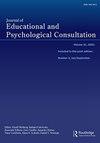咨询培训中的社会公正与多元文化:对学校心理学课程教学大纲的分析
IF 1.1
4区 心理学
Q4 PSYCHOLOGY, EDUCATIONAL
Journal of Educational and Psychological Consultation
Pub Date : 2023-09-29
DOI:10.1080/10474412.2023.2261921
引用次数: 0
摘要
摘要校本咨询培训可能包括各种咨询模式、目标和与不同合作伙伴的合作指导。然而,目前尚不清楚培训师目前是如何组织课程的,以及社会正义在多大程度上融入了课堂。因此,我们系统地复制了Hazel et al.(2010)对咨询培训大纲的分析。我们分析了55所学校心理学课程的63个教学大纲。我们发现许多课程的讲师都以解决问题的模式为基础进行培训。培训人员至少布置了一项与多元文化考虑或社会公正相关的阅读或作业,但社会公正很少作为培训目标的中心。与Hazel等人之前的研究结果相比,我们注意到更多的教学大纲包含了远程咨询和自我反思的主题,这可能对促进咨询中的社会正义至关重要。讨论了调查结果的局限性和影响,包括需要更全面地将社会正义主题纳入学校咨询培训的所有方面。关键词:咨询、多元文化考虑、社会公正、培训、教学大纲分析披露声明作者未报告潜在的利益冲突。作者简介:luhao - jan,博士,罗文大学学校心理学助理教授。主要研究方向为实施科学、文化适应和咨询。Zachary C. LaBrot博士是南密西西比大学学校心理学项目的助理教授。他的研究兴趣包括教师的多层咨询,幼儿教育工作者的实施支持,以及支持家庭满足孩子的学业和行为需求。Cagla Cobek,文学硕士,是南密西西比大学心理学三年级的博士生。主要研究方向为教师导师制对初级教师的干预和教师课堂管理的支持。Ryan SundaRyan Sunda是马萨诸塞大学波士顿分校二年级心理学博士生。他的研究兴趣包括指导初任教师和横向入职教师,以及为教育工作者实施全校范围的反种族主义计划。Lindsay M. Fallon,博士,马萨诸塞大学波士顿分校学校心理学项目副教授。她的研究兴趣包括支持行为的多层系统,以促进种族平等,实施科学,系统变革和社会正义。她是《教育与心理咨询杂志》的副主编。本文章由计算机程序翻译,如有差异,请以英文原文为准。
Social Justice and Multiculturalism in Consultation Training: An Analysis of Syllabi from School Psychology Programs
ABSTRACTTraining in school-based consultation may encompass instruction on various consultation models, aims, and work with various partners. However, it is unclear how trainers currently structure coursework and the extent to which social justice is embedded in class. Therefore, we conducted a systematic replication of Hazel et al. (2010) analyses of consultation training syllabi. We analyzed 63 syllabi from 55 school psychology programs. We found many course instructors grounded training in problem-solving models. Trainers assigned at least one reading or assignment related to multicultural considerations or social justice, but social justice was rarely centered as a training goal. As compared to the Hazel et al. previous findings, we noted more syllabi incorporating topics on teleconsultation and self-reflection, which may be critical to advancing social justice in consultation. Limitations and implications of findings are discussed, including the need to more comprehensively incorporate social justice themes in all aspects of school consultation training.KEYWORDS: Consultationmulticultural considerationssocial justicetrainingsyllabi analysis Disclosure statementNo potential conflict of interest was reported by the author(s).Additional informationNotes on contributorsHao-Jan LuhHao-Jan Luh, PhD, is an Assistant Professor of School Psychology at Rowan University. His research interests include implementation science, cultural adaptation, and consultation.Zachary C. LaBrotZachary C LaBrot, PhD, is an Assistant Professor in the School Psychology Program at the University of Southern Mississippi. His research interests include multitiered consultation for teachers, implementation supports for early childhood educators, and supporting families with their children’s academic and behavioral needs.Cagla CobekCagla Cobek, M.A., is a third-year school psychology PhD student at the University of Southern Mississippi. Her research interests include teacher mentorship interventions for junior teachers and supporting teachers’ classroom management.Ryan SundaRyan Sunda is a second-year school psychology PhD student at the University of Massachusetts Boston. His research interests include the mentorship of beginning and lateral entry teachers and the implementation of school-wide antiracism programming for educators.Lindsay M. FallonLindsay M Fallon, PhD, is an Associate Professor in the School Psychology Program at University of Massachusetts Boston. Her research interests include multi-tiered systems of support for behavior to advance racial equity, implementation science, systems change, and social justice. She is an Associate Editor of the Journal of Educational and Psychological Consultation.
求助全文
通过发布文献求助,成功后即可免费获取论文全文。
去求助
来源期刊

Journal of Educational and Psychological Consultation
PSYCHOLOGY, EDUCATIONAL-
CiteScore
3.40
自引率
23.50%
发文量
20
期刊介绍:
The Journal of Educational & Psychological Consultation (JEPC) provides a forum for improving the scientific understanding of consultation and for describing practical strategies to increase the effectiveness and efficiency of consultation services. Consultation is broadly defined as a process that facilitates problem solving for individuals, groups, and organizations. JEPC publishes articles and special thematic issues that describe formal research, evaluate practice, examine the program implementation process, review relevant literature, investigate systems change, discuss salient issues, and carefully document the translation of theory into practice.
 求助内容:
求助内容: 应助结果提醒方式:
应助结果提醒方式:


